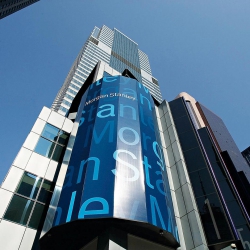
Morgan Stanley Is the Largest Wealth Management Firm in the World
Wall Street firm Morgan Stanley lowered its 2017 estimate for U.S. online gambling 30% on Wednesday. According to Morgan Stanley analysts, American Internet gambling should make about $3.5 in 2017, though their forecasts earlier had been $5 billion.
The respected brokerage stated it remains optimistic about the online gambling industry’s long term prospects, despite challenges in Congress. The reason cited for the lowered expectations were worse-than-expected technical issues. Signups have been lowered than expected in the first four months of online gambling in New Jersey.
2020 Estimate Lowered to $8 Billion
The projected numbers were lowered for 2020, also. Though Morgan Stanley originally suggested revenues in the range of $9.3 billion, the new estimate is $8 billion. Again, this represents a significant amount of revenue for the states involved in licensing, regulating, and taxing their gaming operators.
At present, only 3 states have iGaming, but it is expected more states will legalize online poker sites and casinos in the coming year. Improvements in technology should allow mobile casinos and card rooms to make a far greater contribution to overall revenues in 2017 and 2020, which accounts for the major increases.
Restoration of the Wire Act Legislation
Morgan Stanley’s numbers depend on the hobby remaining legal, something which this week’s introduction of the “Restoration of the Wire Act” legislation puts in doubt. Most analysts believe the proposed legislation will not have the votes for passage in both houses of Congress, despite an impressive bipartisan list of supporters.
Some believe the introduction of a new anti-online gambling bill may be midterm election year politics. Those who sponsor the bill could stand to receive major political contributions from Sheldon Adelson, CEO of the Las Vegas Sands Corp, which last year collected the most money from gamblers of any gaming company in the world. Adelson is concerned that licensed online gaming could encourage problem gambling in the USA.
Venetian and Palazzo Change to 6:5 Blackjack Payouts
Two Las Vegas Sands Corp casinos on the Vegas Strip, Venetian and Palazzo, announced this week they would change their payouts on natural blackjack from the traditional 3:2 to 6:5.
Changing this one rule increases the casino’s house edge by 1.39%. Since single-deck games of blackjack with soft 17 rules have a house edge in the range of 0.20%, the 6:5 payout would increase the house edge by a factor of 8.
Reception by the Online Community
The Las Vegas Sands Corp‘s rules changes is in keeping with a trend among the Vegas Strip casinos in the past twenty years. One analyst estimated about 16% of the blackjack tables on the Las Vegas Strip now use the 6:5 rule, so LVS’s choice for the Palazzo and Venetian will take that percentage about 20%. Also, the classic 3:2 payouts are offered on blackjack tables with $25 minimum bets–the high rollers tables.
Though it is in keeping with trends in Nevada, the decision has received howls from the US gambling community. Online and offline gamblers alike see the decision to take away the game with the best house edge from a gambler’s perspective as hypocritical, combined with Sheldon Adelson’s stated goal of trying to eliminate online gambling. Some online casinos offer the traditional 3:2 payout on $1 bets, so many pundits see Adelson’s political stance as an attempt to eliminate a dangerous rival.
Changing Business Model
The move by the Palazzo and Venetian is an indication of the economy in 2014. Unlike an online casino, Vegas casinos have to pay live dealers to deal cards at a blackjack table. A house edge under 0.50% with $5 or $10 minimum bets is going to produce much lower profits for the bigger casinos, which might wonder why they provide so much space for blackjack tables, when they could install more slot machines. A game with a house edge in the range of 1.80% is much more worth the space commitment.
Online casinos can offer better payouts. Once the software is developed, it is a one-time expense. Even in the more likely chance that it is licensed, it is a smaller fixed cost than having a large staff of dealers and pit bosses. The Internet casinos only need tech support and customer support to handle issues.
Also, the blackjack software resolves hands quicker, so the revenues per hour for a $1 hand online might be the equivalent of a $5 hand offline, while the $5 hand online might be the same as a $25 a hand offline. This is one of the reasons Sheldon Adelson’s argument has some merit, because online gamblers might not realize they’re seeing more hands per hour.
Though early indications are the land-based gambler is not often the same person as the online gambler (85% in New Jersey have not visited a land casino in the last two years), the underlying logic is that some people will not walk through casino doors if they can gamble online. If Las Vegas Strip casinos (and thus the Sands’ many rivals) start offering gaming through their online portals, a certain number of gamblers are bound to stay away from the Strip.
